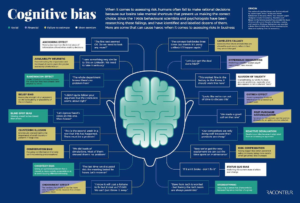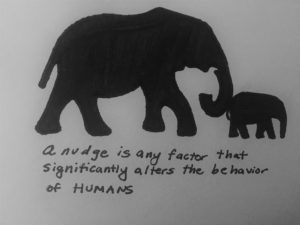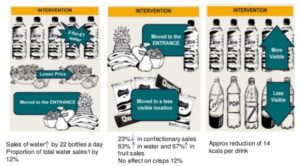Introduction
Human behavior is one of the hardest things to predict and understand. And the more we learn about ourselves, the more we realize that our decision making is very flawed. To put it bluntly, humans do not make decisions in a rational and truly thoughtful way. We are very flawed thinkers who have tendencies to make suboptimal decisions. Consequently, “nudges” can be used to alter our behavior towards more optimal outcomes.
Nudge was written in 2008 by the father of behavioral economics Richard Thaler with help from Cass Sunstein. As a major challenge to the concept of traditional Economic Man (Homo economicus), Nudge rejects this hyper-rational model of the individual. Instead it posits that individuals are simply Humans plagued with automatic thinking, biases, prejudices, irrationality, and uncertainty in their decision making.
The following picture from Raconteur summarizes just a few of our cognitive biases:
Humans are Humans … We Need Help (Nudges)
The entire premise of this book lies in the fact that Humans are not Economic Man. We don’t make unbiased forecasts. We don’t choose unfailingly well. And consequently, we need help to make more rational and optimal decisions in our lives. Enter the Nudge.
The simplest definition of a nudge is any factor that significantly alters the behavior of Humans in a predictable way without forbidding any options or significantly changing their economic incentives.
The key factor in the nudge is that it’s not a coercive action. Its focus is on trying to influence choices that will make Humans better off in the short and long terms. Thaler and Sunstein really believe that people should be free to do what they like and even opt into undesirable arrangements if they really want to. As policy makers and private institutions then, it’s on us to make it easier for people to exercise this freedom in the direction that makes their lives better, which is why we use the nudge.
How We Set Up Choice Matters as Well
Because Humans are not Economic Man, the manner in which choices are presented to us can greatly influence our decisions. The best way to explain this concept (choice architecture) is to think through how food is offered in a cafeteria. By moving healthy food forward to the beginning of the line or to eye level, choice architects can greatly impact the frequency with which healthier food is chosen. It’s the same reason why retailers put impulse buy items near checkout and why they move items throughout their stores from place to place.
As a choice architect, you have the ability to influence outcomes simply by how you lay out and present options. Small yet seemingly insignificant details will have major impacts on people’s behavior.
In Closing
Humans have a tendency to move towards a state of inertia, and given this we don’t always make the decisions that are in our best interest. To quote the Guardian, “real men and women are inconsistent, ill-informed, weak-willed, and lazy. We can’t be bothered to fill out the form that would get us in the company pension plan, we forget to cancel subscriptions and we slump on the sofa eating doughnuts when we should be doing yoga. We are virtually incapable of balancing the temptations of today with the rewards of tomorrow; for some of us, even instant gratification isn’t quite quick enough.”
Nudges can save us from our inability to act rationally and the core of this book drives home this very point.
Extras
Brian Nwokedi’s Book Review on Goodreads
Brian Nwokedi’s Twitter
Direct Link to Book: Nudge
Author’s Website: Richard Thaler
Author’s Twitter: @R_Thaler
Video: Nudge Summary in 2 Minutes



